Blazing Saddles and The Matrix
One of these movies couldn't be made today, and it's not Blazing Saddles.
I am exposing myself as a Gen Z in order to present a review(?) of two landmark films that celebrated anniversaries over the past two weekends. I say expose because I feel like it’s absurd to claim that I haven’t seen The Matrix unless I had, in fact, been born after 1999, so I might as well go ahead and state it outright.
But Blazing Saddles (1974) first.
Mel Brook’s Blazing Saddles was rereleased to theaters for its 50th anniversary about two weeks ago, and aside from one family down near the front, I was the only “young” person in a sold-out room. Who knew that watching a film in a room full of people who actively enjoy the film would make for an enjoyable experience?
This is the second Mel Brooks film I’ve attempted. It pains me to say this, but I want to like Mel Brooks more than I’m actually inclined to. I appreciate, admire, and acknowledge his style and his influence on comedy in film, but liking his style of comedy? I didn’t like Young Frankenstein (I know, I know, I have no taste, or so the Germans would have us believe), which came out the same year as Blazing Saddles. I am very happy (and mildly relieved) to say that I did enjoy Blazing Saddles far more.
Most of the online discussion around Blazing Saddles now seems to level around how well the comedy aged. I think there’s a difference between a film that ages poorly and a film that means more to a certain generation, and Blazing Saddles would fall into the latter. I thought it was funny, but I could also tell that it meant so much more to the other 99% of the audience in that theater. The core audience understood the slow, desired death of the western and the expectations for comedy in film. No one wants to explain a joke; besides ruining the joke, an explanation can never fully explain something like humor; you either get it or you don’t. But if you get it, the joke becomes that much funnier. Sometimes the best explanation is simply listening to what makes another person laugh, if not what makes them verbally wince.
I mean, I understood and enjoyed the sweeping, glorious title song that hearkened to the classics, and I also understood the context for the scene that immediately followed, but conceptual appreciation doesn’t translate to entertainment. It took a good amount of time to get adjusted to the humor, though unexpectedly I wasn’t the only person who had to adjust. Several opening scene jokes were met with audible uncomfortable laughter. One joke was met with a few groans. However, once better adjusted, the film did get continually funnier. I don’t know if that’s just a result of warming into it, or if it’s the natural escalation of the film, but the non-stagnant humor is a strength.
Plot? You somehow forget what Blazing Saddles (1974) is about and want a short teaser of the premise? Okay, I guess. I’ll try to limit spoilers.
Premise: Western thugs are trying to drive townsfolk out of their home in order to build a railroad on the land. A newly-appointed Black sheriff enters the town to save the day; the townsfolk hate Black people. Unbridled lampooning of the Golden Age of the Western. Death of the genre until Unforgiven in 1992, here we come.
I want to talk about Gene Wilder. He is the one true shot of sincerity through the entire film.
From the moment he falls into frame to his ride off next to the sunset, Wilder as “The Waco Kid” doesn’t engage in the lampoonery. He is the straight man sitting back and enjoying the view, always ready to poke fun at the tropes but offering enough self-awareness and drama to ground the toppling weight of every other gag. He pairs perfectly with Cleavon Little, who plays Bart, the sheriff, and the film’s humor only really clicked when the two of them came together—though, to be fair, Wilder’s humor is much more dialogue-based than the visual gags connected to the villains, whom much of the early act is centered around, so this is also a humor preference.
Not that I’m against visual gags. The third act is so audacious that it would be supremely dissatisfying if Brooks hadn’t stuck out for a happy ending, but he did, so it’s supremely admirable instead. In terms of humor, the first and third acts also pinpoint different targets. The first act focuses on different groups: Black people, Chinese people, Westerns, more Westerns, hunchbacks (Mel Brooks does have a thing for hunchbacks), and the third act focuses more on different concepts: bandit raids, moviemaking, employment, endings, distractions, and big action sequences. And maybe one type of humor is necessary for the other, larger-reaching humor to step on and peer smugly over the body of work, but I’ve always preferred humor that doesn’t tear somebody down, even if that’s part of the point.
I did like the film. I know a lot of this yapping has been implicitly ragging on it, but at the end of the day, you can’t go wrong with horse miniatures being blown up into the sky. 50 years later, it is a very compelling, funny movie—just not the best comedy ever made.
And no, before you ask, I don’t have a comedy masterpiece in mind. I’ll have to make up one soon.
Shifting to the The Matrix (1999).
Look, if I were to tell you that one of these movies couldn’t be made today, would you believe me for saying it isn’t Blazing Saddles? I truly believe that of the two, The Matrix would be a harder sell—at least, to an audience. If someone made Blazing Saddles, it would be controversial, but the jokes would still stand. It would find an audience that would appreciate it for what it was. If someone made The Matrix today, no one would take it seriously. It would be too meta. It would be too on-the-nose. It wouldn’t be realistic enough. It would be too campy. It would be one of those movies where people preface their enjoyment with an excuse. It’s because it came out in 1999 that it was preserved at the height of its reputation for all of time after.
I didn’t get as good of a look of the audience, but it definitely skewed more towards Millennials. Like Blazing Saddles, it’s worth seeing in a theater, but for a completely different reason—the film looks incredible on a theater screen.
The Matrix has entered such a state of cultural osmosis that everyone assumes everyone else has already seen it. Red pills and falling code and the idea of the Matrix itself are common references in design and online. The nice thing about cultural osmosis is that nobody feels the need to explain the reference, so I didn’t actually know anything about The Matrix besides a vague idea of the Matrix itself. Unfortunately, a “celebration of the Matrix” retrospective showed right before the film, which spoiled some (arguably trivial) pieces of the plot.
Plot? No, I don’t think I’ll explain it. Let any unfamiliar readers find out when they watch the movie, too.
Cyberpunk, the sci-fi variant that juxtaposes advanced tech and squalor, appears to have reached its height in film during the late 1990s before falling off and sticking to literature, although it did begin to make a resurgence in the mid-2010s. Besides being an action movie, The Matrix is a science fiction and separately a cyberpunk. In terms of the science fiction backstory, the movie didn’t enthuse me, but in terms of the cyberpunk, I’ve never seen anything as moving. I’d previously read Neuromancer and found the genre pessimistic and cold, full of the seedy underbelly of life and the apathetic results of interacting with such an artificial plane. But all of the humans in this movie—even the villainous humans—are very earnest. They’re unexpectedly warm and optimistic. They could never be mistaken for someone trying to emulate a machine.
The movie makes a point to call 1999 the peak of civilization several times, which is a bold move, even if that’s the year it released. Such confidence. But I wouldn’t argue if someone called it a peak of filmmaking. This movie had style. If this is what action movies were like, no wonder they were all the rage. They didn’t explode for the sheer attempt to impress you with explosion size; they exploded and made you feel the impact, thematically. They didn’t just have shootouts, they had shootouts with cartwheels. They didn’t rely just on the expectation for each scene, they filled it up with personality. No wonder moviegoers are dwindling. There’s nothing to see. So many movies today are glorified plot summaries and fireworks; there’s no nuance, no additions made. Movies are a visual medium. Why don’t more movies take advantage of the storytelling qualities inherent to film?
The Matrix may not have the most compelling story (maybe that’s controversial to say), but every single visual quality advocates for the way that the story is told. Every potential negative quality binds together into a product that elevates every element involved. The viewer is thrown in somewhat jarringly. The costumes don’t seem necessary. The writing is blunt. Visual metaphors emphasize preceding dialogue in a way that makes it clear the director is making a visual metaphor. And yet these are the strengths that make the film what it is. The early shot of the empty stairway establishes the atmosphere more than any dialogue ever could. The early unexplained context is found out to be unneeded in retrospect. Who cares if the costumes don’t follow complete logical reasoning from a storytelling perspective, they line up with human reasoning for someone getting to spawn whatever clothes they want right before pulling a boss move. The blunt writing works as a relief when explaining the concepts. The visual metaphors help you remember that, unlike the more realistic style of film storytelling today, there used to be less shame in obviously taking advantage of the storytelling elements that naturally come with film.
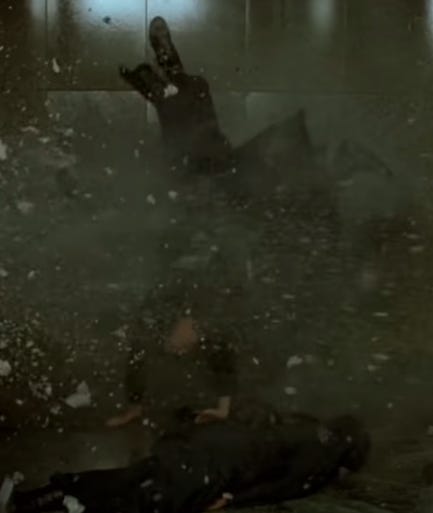
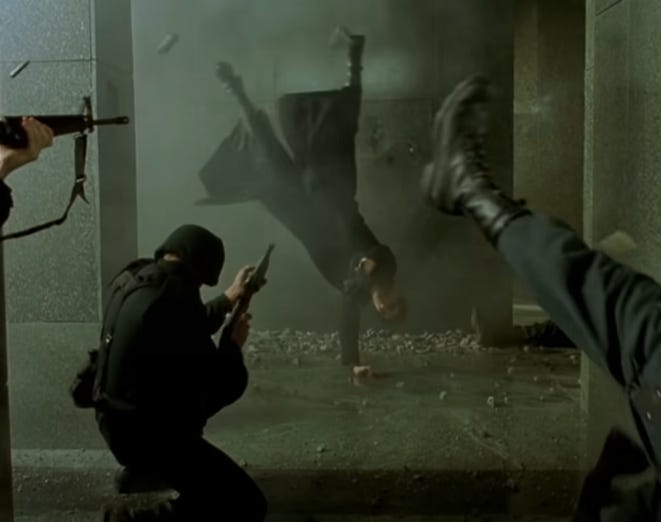
By the time the action music and the action fighting and the action CGI push the main character through his climactic scene, The Matrix is the coolest movie in the world. It is the movie equivalent of someone hanging every available stat point on exactly one quality. It rides on the sheer power of coolness, and it works. The level of visual cohesion it manages to pull off will probably never be reproduced.
Happy 50th anniversary to Blazing Saddles, and happy 25th anniversary to The Matrix. Perfectly preserved products of their time. I can only hope that a 25th anniversary somewhere down the road for Gen Z will show itself to have some fraction of heart that these two have.
If you would like to express further support by leaving a tip, you can “buy me a coffee” here.
Any ideas for re-releases?


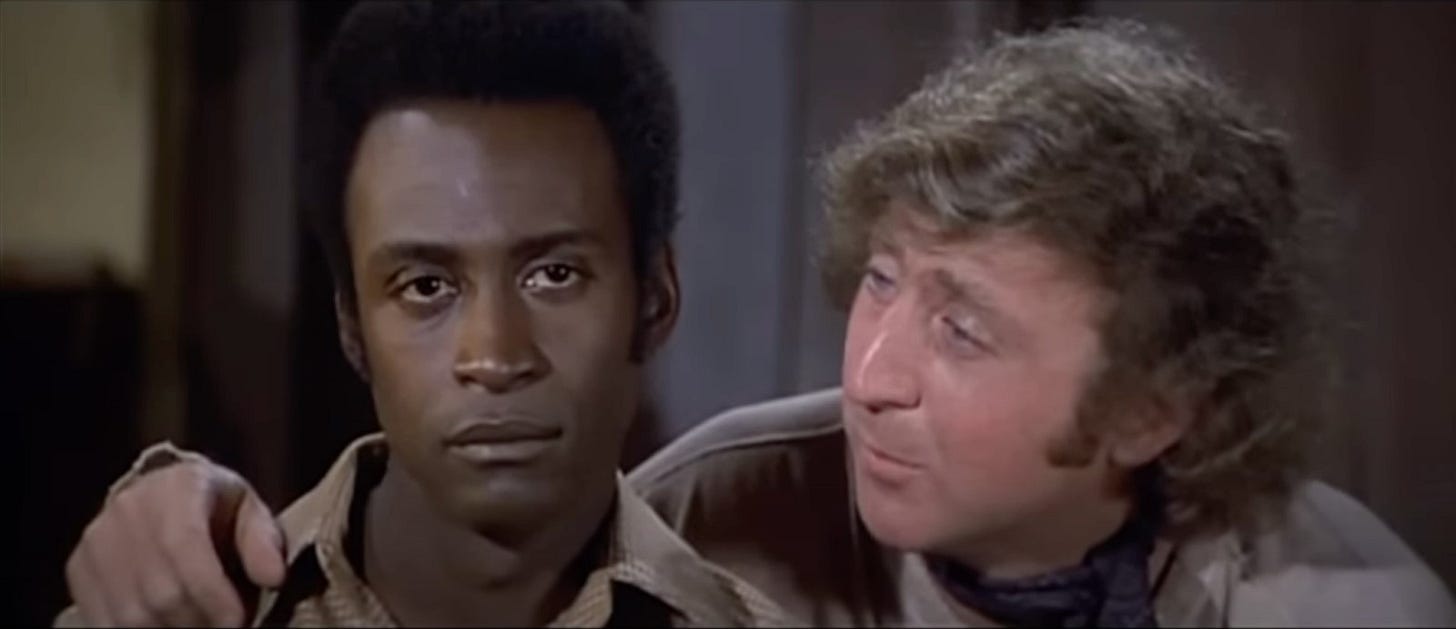
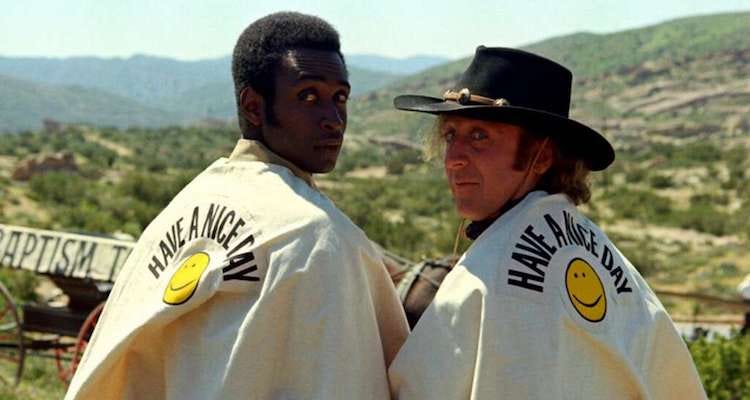
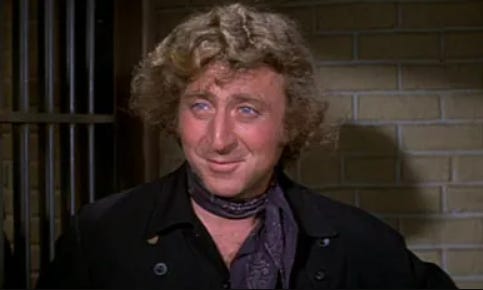
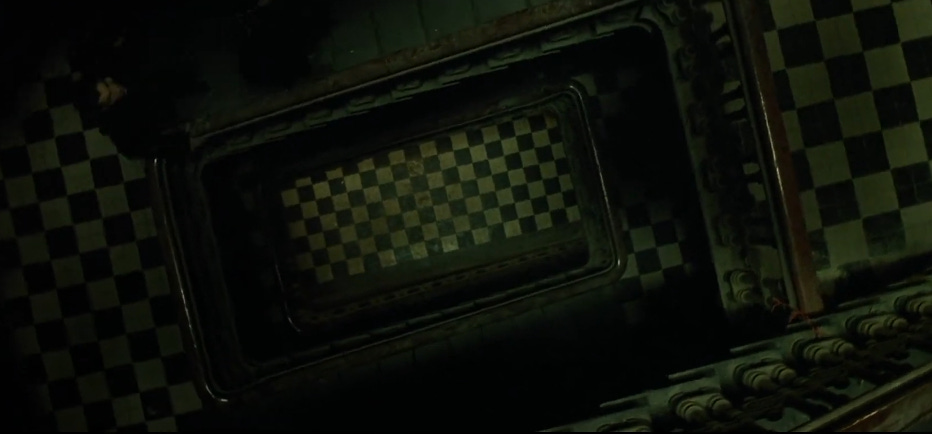
Yeah, the Matrix sequels were garbage. Same visual effects, but none of the heart. You can see the directors stole the script for the first one from someone else (she sued them and won). Their spinoffs were garbage because they didn't have the magic. I have less opinion on Mel Brooks. Like you, I wanted to find them funny, but they were just so crass.